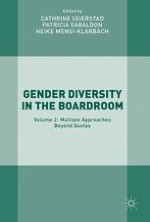2017 | OriginalPaper | Buchkapitel
2. UK: The Merits and Shortcomings of a Voluntary Approach
verfasst von : Elena Doldor
Erschienen in: Gender Diversity in the Boardroom
Aktivieren Sie unsere intelligente Suche, um passende Fachinhalte oder Patente zu finden.
Wählen Sie Textabschnitte aus um mit Künstlicher Intelligenz passenden Patente zu finden. powered by
Markieren Sie Textabschnitte, um KI-gestützt weitere passende Inhalte zu finden. powered by
